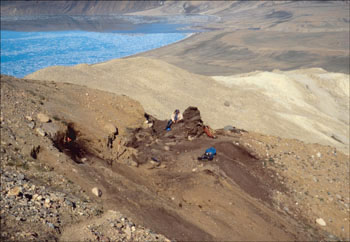Browse "Things"
-
Article
Electric-Power Transmission
Electric-power transmission lines carry power from generating plants (see electric-power generation) to the distribution systems that feed electricity to domestic, commercial and industrial users.
"https://development.thecanadianencyclopedia.ca/images/tce_placeholder.jpg?v=e9dca980c9bdb3aa11e832e7ea94f5d9" // resources/views/front/categories/view.blade.php
https://development.thecanadianencyclopedia.ca/images/tce_placeholder.jpg?v=e9dca980c9bdb3aa11e832e7ea94f5d9
-
Article
Electric Utilities
Electric utilities are private or government organizations involved in the production, transmission, distribution, marketing and sale to consumers of electric power. Canadian electric utilities account for approximately 92% of the total production of electrical energy in Canada.
"https://development.thecanadianencyclopedia.ca/images/tce_placeholder.jpg?v=e9dca980c9bdb3aa11e832e7ea94f5d9" // resources/views/front/categories/view.blade.php
https://development.thecanadianencyclopedia.ca/images/tce_placeholder.jpg?v=e9dca980c9bdb3aa11e832e7ea94f5d9
-
Article
Electrical Appliances Industry
The dominant activity of the electrical appliance industry in Canada is the design, manufacture and sale of major household appliances. The core products (ie, those with very high saturation levels, approaching the category of necessities) are refrigerators, ranges, automatic washers and dryers.
"https://development.thecanadianencyclopedia.ca/images/tce_placeholder.jpg?v=e9dca980c9bdb3aa11e832e7ea94f5d9" // resources/views/front/categories/view.blade.php
https://development.thecanadianencyclopedia.ca/images/tce_placeholder.jpg?v=e9dca980c9bdb3aa11e832e7ea94f5d9
-
Article
Electrical Engineering
Upon graduation, many electrical engineers form their own companies to manufacture electrically based products or to provide consulting services. Others become involved in research, design, manufacture, sales or maintenance of electrical equipment.
"https://development.thecanadianencyclopedia.ca/images/tce_placeholder.jpg?v=e9dca980c9bdb3aa11e832e7ea94f5d9" // resources/views/front/categories/view.blade.php
https://development.thecanadianencyclopedia.ca/images/tce_placeholder.jpg?v=e9dca980c9bdb3aa11e832e7ea94f5d9
-
"https://development.thecanadianencyclopedia.ca/images/tce_placeholder.jpg?v=e9dca980c9bdb3aa11e832e7ea94f5d9" // resources/views/front/categories/view.blade.php
https://development.thecanadianencyclopedia.ca/images/tce_placeholder.jpg?v=e9dca980c9bdb3aa11e832e7ea94f5d9
-
Article
Elites
As used every day, elite is an adjective referring to the upper echelon of any activity - eg, elite athletes or elite soldiers. Used more analytically as a noun, elites are those who hold the uppermost decision-making positions in important activities organized in a definite hierarchy.
"https://d2ttikhf7xbzbs.cloudfront.net/media/media/5090b907-78e2-4d1d-82a1-12e989970250.jpg" // resources/views/front/categories/view.blade.php
https://d2ttikhf7xbzbs.cloudfront.net/media/media/5090b907-78e2-4d1d-82a1-12e989970250.jpg
-
Article
Elizabeth Fry Society
The Elizabeth Fry Society is a not-for-profit social service agency that provides support for women and girls involved in the Canadian justice system. The Society provides a range of services to women who are criminalized and to women who are at risk of being criminalized. It works to reduce the impact of criminalization, to provide equal opportunities for women in the justice system and to empower marginalized women.
"https://d2ttikhf7xbzbs.cloudfront.net/media/Mrs._Fry_reading_to_the_prisoners_in_Newgate_John_Johnson.jpg" // resources/views/front/categories/view.blade.php
https://d2ttikhf7xbzbs.cloudfront.net/media/Mrs._Fry_reading_to_the_prisoners_in_Newgate_John_Johnson.jpg
-
Article
Elizabeth Wettlaufer Case
Elizabeth Wettlaufer is a former nurse who murdered eight elderly patients and attempted to harm six others in southwestern Ontario between 2007 and 2016. One of the most prolific serial killers in Canadian history, she was sentenced to life in prison for the murders in 2017. The case prompted widespread public outrage and made headlines internationally. It later resulted in lawsuits against Wettlaufer, and the nursing homes she worked for, and a sweeping provincial inquiry into flaws in Ontario’s long-term care system.
"https://development.thecanadianencyclopedia.ca/images/tce_placeholder.jpg?v=e9dca980c9bdb3aa11e832e7ea94f5d9" // resources/views/front/categories/view.blade.php
https://development.thecanadianencyclopedia.ca/images/tce_placeholder.jpg?v=e9dca980c9bdb3aa11e832e7ea94f5d9
-
Article
Ellesmere Island Eocene Fossils
Having been mapped on foot, by dogsled, and from the air by rugged geologists from the GEOLOGICAL SURVEY OF CANADA, the Canadian High Arctic was untouched by vertebrate palaeontologists until the mid-1970s.
"https://d2ttikhf7xbzbs.cloudfront.net/media/media/aad2c212-c087-43c4-8332-2d38b2f04f6d.jpg" // resources/views/front/categories/view.blade.php
https://d2ttikhf7xbzbs.cloudfront.net/media/media/aad2c212-c087-43c4-8332-2d38b2f04f6d.jpg
-
Article
Ellesmere Island Pliocene Fossils
Toward the close of the Tertiary (5 to 2 million years ago) and the beginning of the ice age (Quaternary - about 2 million years ago), a beaver pond existed on what is now Canada's Ellesmere Island, Nunavut.
"https://d2ttikhf7xbzbs.cloudfront.net/media/media/4bdc5be8-286b-4108-81c1-9602995884ad.jpg" // resources/views/front/categories/view.blade.php
https://d2ttikhf7xbzbs.cloudfront.net/media/media/4bdc5be8-286b-4108-81c1-9602995884ad.jpg
-
Article
Elm
Elm (Ulmus), genus of trees of elm family (Ulmaceae), found only in temperate regions of the Northern Hemisphere.
"https://development.thecanadianencyclopedia.ca/images/tce_placeholder.jpg?v=e9dca980c9bdb3aa11e832e7ea94f5d9" // resources/views/front/categories/view.blade.php
https://development.thecanadianencyclopedia.ca/images/tce_placeholder.jpg?v=e9dca980c9bdb3aa11e832e7ea94f5d9
-
Article
Emblems of Canada
Emblems of Canada include the national coat of arms and flag. When John Cabot arrived on the shores of North America in 1497, he raised a cross and the royal banner of England. Since then, Canada’s emblems have evolved out of those traditionally used by France and Britain.
"https://d2ttikhf7xbzbs.cloudfront.net/media/media/810e05f9-098e-42c8-a510-3500d30f3e73.jpg" // resources/views/front/categories/view.blade.php
https://d2ttikhf7xbzbs.cloudfront.net/media/media/810e05f9-098e-42c8-a510-3500d30f3e73.jpg
-
Article
Emergencies Act
In July 1988, the War Measures Act was repealed and replaced by the Emergencies Act. The Emergencies Act authorizes “the taking of special temporary measures to ensure safety and security during national emergencies and to amend other Acts in consequence thereof.” In contrast to the sweeping powers and violation of civil liberties authorized by the War Measures Act, the Emergencies Act created more limited and specific powers for the federal government to deal with security emergencies of five different types: national emergencies; public welfare emergencies; public order emergencies; international emergencies; and war emergencies. Under the Act, Cabinet orders and regulations must be reviewed by Parliament, meaning the Cabinet cannot act on its own, unlike under the War Measures Act. The Emergencies Act outlines how people affected by government actions during emergencies are to be compensated. It also notes that government actions are subject to the Canadian Charter of Rights and Freedoms and the Canadian Bill of Rights.
"https://d2ttikhf7xbzbs.cloudfront.net/media/media/c8a1d56b-60f5-40b0-86e2-3ce31bc3e7b0.jpg" // resources/views/front/categories/view.blade.php
https://d2ttikhf7xbzbs.cloudfront.net/media/media/c8a1d56b-60f5-40b0-86e2-3ce31bc3e7b0.jpg
-
Article
Emergency Preparedness
Emergency Preparedness Canada (EPC) is a federal government organization within the Department of National Defence. It plays an important role in the development and maintenance of civil emergency preparedness in Canada.
"https://development.thecanadianencyclopedia.ca/images/tce_placeholder.jpg?v=e9dca980c9bdb3aa11e832e7ea94f5d9" // resources/views/front/categories/view.blade.php
https://development.thecanadianencyclopedia.ca/images/tce_placeholder.jpg?v=e9dca980c9bdb3aa11e832e7ea94f5d9
-
Article
Emigration
Emigration refers to the act of leaving one's region or country of origin to settle in another. This is unlike immigration which is the action of arriving in a country.
"https://development.thecanadianencyclopedia.ca/images/tce_placeholder.jpg?v=e9dca980c9bdb3aa11e832e7ea94f5d9" // resources/views/front/categories/view.blade.php
https://development.thecanadianencyclopedia.ca/images/tce_placeholder.jpg?v=e9dca980c9bdb3aa11e832e7ea94f5d9
